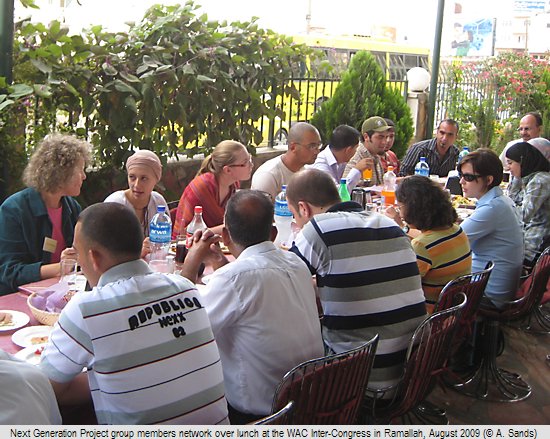The Next Generation Project was founded in 2009 by the authors who were post-baccalaureate students in the western United States about to embark on our graduate careers. Our goal in beginning this endeavor was to employ social networking technologies in service of our jointly shared interests in the future of archaeology, cultural heritage, site protection, policy and our careers. Next Generation is a multi-agent, multi-site cultural diplomacy network with an activist focus that seeks to create spaces for emerging archaeologists to discuss topics, concerns and shared possibilities both online and through face-to-face meetings.
We chose Facebook as the platform for the online portion of our project in order to de-center the traditional power structures in archaeology (i.e. journal and book publications). We use Facebook because it is unfiltered and provides an opportunity for us to hear each other's opinions and prejudices without the intervention of professional mentors and editors.
Facebook itself is a conduit for hundreds of archaeological and cultural heritage-based 'groups'. These groups all have discussion boards, some of which are used more than others. All of the sites include topics and information related to news stories in archaeology and information publicizing schools and fieldwork programs. However, only a few sites host serious archaeological discussions. The lack of real, serious conversation in these groups is worrisome. Why is it that archaeologists are not discussing these important topics and instead are using this virtual real estate for simple advertising? Regardless of the reason for the scarcity of sincere debate on social networking sites, something should change. Indeed, Next Generation co-opts these online 'groups' to work towards interdisciplinary, intellectual and ethical growth in our discipline.
We in the Next Generation worry about the lack of critical dialogue because Facebook and social networking sites have the unique ability to truly attract archaeologists from all over the globe and it is a shame to let this opportunity go to waste. The online environment exists beyond organizations and conferences, and thus provides a perfect medium for continuous dialogue between people in different locations. As a 'lay' networking site, Facebook and similar sites have far more global reach than other kinds of organizations. Organizations that truly attract international scholars (like WAC) are few and far between.
For the first six months of the Next Generation Project, members interacted online through the Facebook group http://www.facebook.com/home.php?#!/group.php?gid=60913977483 using the discussion boards to post and respond to various topics of interest. The first group of project participants met for the inaugural meeting of the Next Generation Project at WAC's Inter-Congress in Ramallah in August 2009. During this meeting, the authors learned the extent to which Palestinian scholars do not share an equal level of access to educational resources because of ongoing conflict. Palestinian students are limited in the amount of education they can receive solely based on their geographic location. Our experiences in Ramallah made us take a closer look at other areas and periods in our recent history where conflict and archaeology seem to be intertwined.

One online discussion topic that arose following the meeting in Ramallah was that of Archaeological Practice in Conflict and Post-Conflict States. One question specifically asked, "What factors do you think affect archaeological practice in conflict and post-conflict states? What are some of the challenges faced by threatened and/or recovering nations?" Another topic that arose was that of Archaeology and Politics. The question specifically asked: "Is archaeology inherently political? Or should archaeologists be involved in politics?" The high level of depth of the responses shows examples of how young scholars around the world respond to these questions. The diversity of perspectives is heartening, and all are invited to take a closer look at these conversations by visiting the Next Generation Facebook group.
There were a number of other lessons learned that participants of the WAC meeting in Ramallah and the Archaeology in Conflict meeting in Vienna will keep as we move forward into our archaeological careers. We learned these lessons because we were able to travel to the conference locations to see, hear and experience Archaeology in Conflict firsthand. We use Facebook as an avenue to begin conversations and international conferences to make them tangible; it is through both the technological and the personal that we foster genuine relationships with our peers.
It is only through sincere and open discussion with people from various ethnicities and nationalities that we can grow as archaeologists and scholars to develop an informed, global perspective that will contribute positively to cultural heritage management and archaeology. The voices of the Next Generation of archaeologists are a vital part of the conversations about archaeological ethics now and into the future. The Next Generation Project provides a vital forum for us to create relationships that will enable us to work more effectively together and to communicate in ways that we have only begun to explore.
![]() © Ashley Sands, Kristin Butler
© Ashley Sands, Kristin Butler
e-mail: ashleysa@ucla.edu
This article should be cited like this: A. Sands, K. Butler, The Next Generation Project: Discussing Archaeology in Conflict, Forum Archaeologiae 55/VI/2010 (http://farch.net).